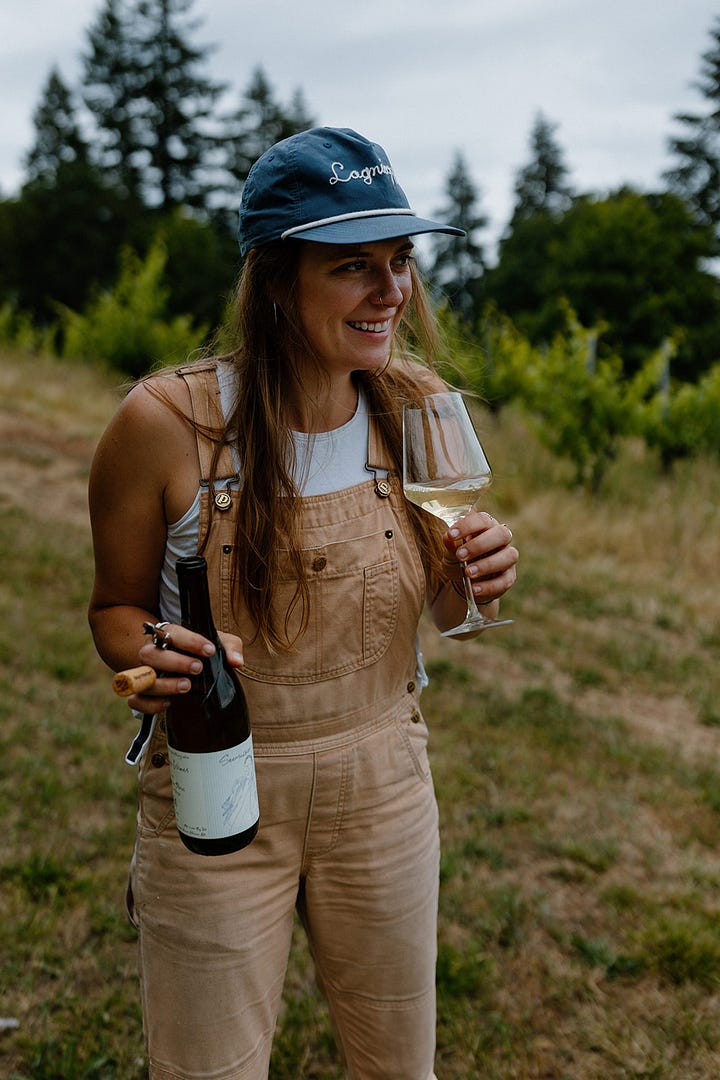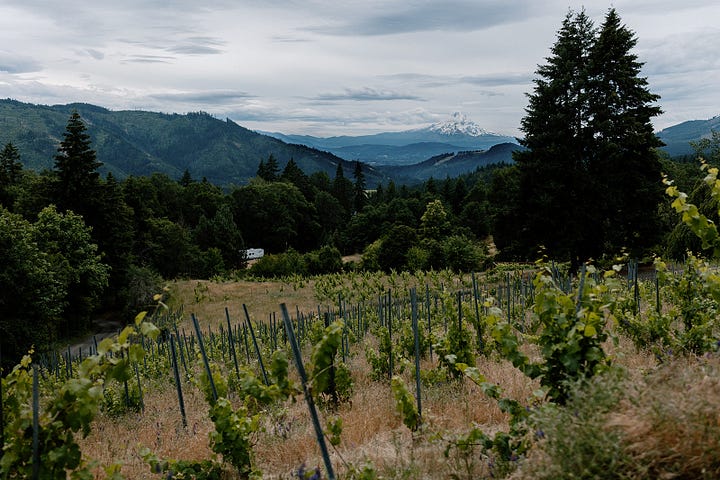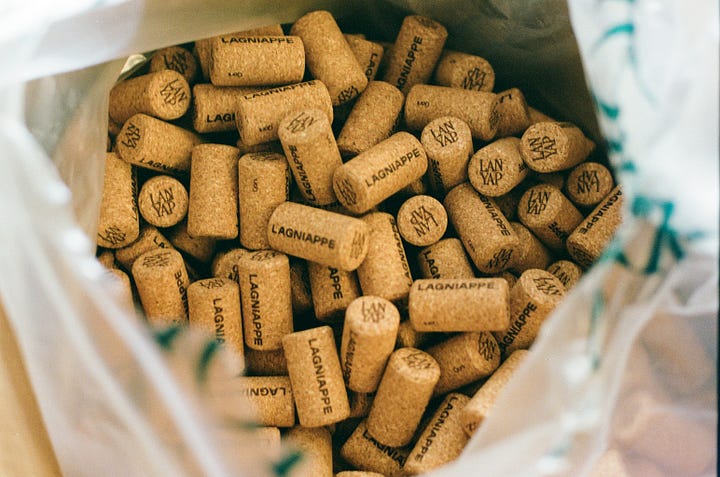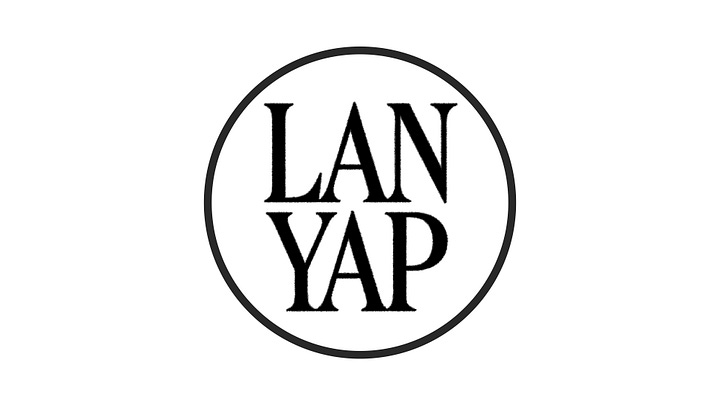Choosing to do Things that Make You Feel Whole: Interview with Winemaker and Founder of Lagniappe Wines, Lisette Hrapmann
This week’s interview is with winemaker and founder of Lagniappe Wines, Lisette Hrapmann.
Lisette graduated from college at LSU with plans to farm hop around the globe and continue her studies of interdependent agricultural societies. Her first stop at a winery in California proved to be fortuitous and set her on a path that was much different than what she’d originally envisioned. She developed an unexpected passion for the world of winemaking and spent the next several years working in cellars and traveling through California, Chile, and France to hone her craft.
When Covid upended her plans to continue working in Chile, Lisette found herself headed to Oregon’s Columbia Gorge to stay for what she thought would only be a few months. Two weeks in, she purchased her own grapes on a whim and began experimenting with making her own wine in a friend’s garage. At the time, she’d merely been curious to see what she could create. However, that first wine, Fizzy Lizzy Wine’s Swampwater, was a success. With the world still shutdown, Lisette decided to move full-time to Oregon and hasn’t looked back since. Today, she’s working full-time on her brand while she and her partner, Brent Smith, work towards their dream of owning their own property.
I first heard about Lisette’s story from our dear mutual friend Erin who generously bought me a bottle of Swampwater a few months ago. (I love a sparkling white wine and count Swampwater among my favorite wines I’ve ever tasted - go try it!). I wanted to know more: How does one find themselves in the wine industry? What’s it like to farm hop around the globe? Did she ever feel lost? How has she learned to navigate the space of the unknown? What’s she learning about herself as she goes full time on her own project for the first time?
We spoke about all of that as well as:
How the fear of not taking advantage of opportunities pushed her to go all in
What she’s found in doing something that makes her feel whole
How scaling back and starting small can help you find the courage to pursue a passion
Note: The following interview has been lightly edited for clarity and length. While every effort has been made to preserve the integrity of the conversation, please be aware that the quotes may not be verbatim but reflect the essence of the dialogue.
I'll start with just a few basic questions to set the scene.
Where are you living right now? I live in the Columbia Gorge in a town called The Dalles. The gorge is on the border of Oregon and Washington and the Columbia River runs through it.
How do you describe your occupation? Mayhem (laughs). At least that’s how I feel about it today. I very recently have become a vigneron, which means I farm my own grapes to make my own wine. I entered into a lease agreement where in exchange for my labor and upkeep of the value of three different properties, I take away the fruit. In general, I’d be called a winemaker but during the growing season, there isn’t much winemaking happening.
I want to go back to the beginning of your story. I read that after college you decided to go farm hopping. What was that experience like for you? Did you feel lost or scared, or did you feel like you trusted that you’d figure things out over time?
I graduated from LSU with a degree in sociology. I focused on religious studies, and then agricultural interdependence. I studied abroad in Rome where the World Health Organization is based and was lucky to have a really inspiring professor who traveled around South Africa living with and learning from a tribe who migrated with a pack of gazelles. I thought, “Cool, count me in!” That’s the kind of thing I dreamt of and anticipated casually doing after school. Also, I was at a loss for answering, “What do I do now?” and thought I’d just go explore and follow my curiosity by farm-hopping around the world. Unfortunately, but also fortunately, my first stop was working a wine harvest in California. I never went farm hopping in the sense that I was dreaming about. Working in the wine industry during that first harvest turned into a full-time job in that cellar. There’s definitely a transient life early on in someone’s wine career. Once you tap into the wormhole that is wine, you realize that it's worldwide and so intertwined with culture everywhere. It’s done differently across so many different climates and terroirs. It’s just a bottomless pit of what you can learn. I did go farm hopping in that sense. I was based in California for about 2 years and also worked in Chile, and then Burgundy in France. Eventually, I landed in Oregon where I haven't really left since. I still have a lot of curiosity towards other growing regions so I may go explore again one day. So long story short, it was in a much more organized fashion than I first dreamt of doing.
Once you realized that wine was going to be a thing for you, were there ever points in those early days where you fell lost or did you just trust that following curiosity would lead you in the right direction?
I’m not sure if there was ever a single moment where I said, “Oh, this is what I’m going to do.” It feels like it's very much fallen into my lap and come together naturally. I was scared of not taking advantage of all my opportunities. I felt like I was kind of half-assed taking opportunities. At some point, things clicked, and I just went for it. I keep risking everything and more opportunities keep presenting themselves, which affirms what I’m doing and allows me to do things authentically. I just keep moving forward with genuinely calculated risk and choosing to do things that make me feel whole.
I want to double down on this because I think you have a really rare ability to trust yourself to figure things out. That’s not an easy thing to come by. What helps you stay grounded in that self-trust and open to continuing to take risks?
I have an incredible support community. My partner and I collectively have about 20 years in the industry but with different experiences. His experiences are nearly opposite of mine and so anywhere that I have a lacking point he has experience and advice and vice versa. He hasn’t had his own brand so he keeps me grounded and reminds me to stay focused and not have my hands in too many different baskets.
I’m not exactly sure where that self-trust comes from. Early on in my career, when I was just an intern and a cellar worker before I had my own project, I was just following the path that I was on. I got lucky. There are many people who work the transient, farm-hopping lifestyle. I lucked out that my first wine experience set me on such a good path. I landed a gig at Mauritson Winery in California in the Dry Creek Valley. I worked for a badass, female winemaker named Emma Hall who was incredibly generous in sharing every bit of information she had. It wasn’t until halfway through the harvest that I realized I’d discovered a whole world and could go travel. It wasn’t until I worked for other cellars that I really got to value how much Emma had poured into me.
I had a natural common sense of the engineering and the mechanic aptitude that allowed me to survive working in a cellar without any prior knowledge. I think that growing up in a family that was very athletic and creative carpentry-focused made working in the cellar feel very natural.


What led you to start making your own wines?
It was Oregon. I was in Chile working a harvest when the covid lockdowns happened. I’d met a guy down there and thought I was never going to leave. Chile. I wanted to move there. I ended up back in New Orleans on April 1st and left for Oregon a few months later. My best friend from college, Jorge, asked me: “Are you going to keep traveling? Is this turning into something?” I told him, “I don’t know. I've only been in the industry for 2.5 - 3 years. I don’t think I have the skill set to make my own wine. I don't even know if that's what I want to do. I'd love to have the autonomy and enough tenure in someone’s cellar to have pride and ownership of where I am.” I think I was looking for a place to be more permanently and searching for what wine-making region that would be.
I then went to Oregon to work a harvest thinking I was just going to be there for 3 months before heading back to Chile. I’d only been there for two weeks when I bought some fruit and started making wine in a friend’s garage. That was my first vintage of fizz. Oregon is a really special place. The wine-growing region, comparatively to everywhere else, is most like New Orleans in the sense of camaraderie and the community and tradition.
It all happened very spontaneously. I didn't really start thinking about where it was all going until Jorge sort of asked me: “What the hell are you doing?” (laughs). I rented a Dodge caravan, and my best friend came up, and we drove all the wine back to New Orleans. I sold it all very quickly and the world was still shut down so I said, “Why not? Why not move to Oregon and see what happens?”
I moved to Oregon and pursued a position at an established winery in the area, and they invited me to make my wine more seriously within their cellar. I’m now at a point where I’m taking things more seriously. There’s a lot on the line. There's been some affirmation where I’ve started to believe people when they say they like my wine.
What was it like making your own wine before you had external validation from outside sources?
Initially, making my own wine was all coming from curiosity. I wanted to see if I could make a healthy wine, and I wanted to see if I could make fermentation happen. The fact that the first time went pretty swimmingly was a surprise. I wasn’t looking to make the best wine. I was just looking to make a wine. It’s only now that I’ve pivoted to focus on honing my craft. I want to do it the best way I can and use every bit of knowledge I have to make decisions to the best of my ability. I don’t trust people who are in my life when they say, “I love your wine.” I say, “You just love that I make it!” They probably do like my wine, but I never seem to get harsh criticism from them.


Has the way you feel about the work changed now that you’ve decided to pursue it with a more serious focus?
I think it has a little bit. At the same time that I’m starting to take the work more seriously, I also recognize that I’ve grown a lot. There is more stress involved now, but it’s mostly self-inflicted from timelines and the pressure I've been putting on myself. I've always put myself under a lot of pressure and been a heavy self-critic.
I love what I do. I started working for myself independently in February, and there has been a lot of momentum as I’ve pivoted away from working on someone else’s project to working on my own. My project has now become my 50-hour-a-week thing, whereas before I didn’t have the energy or attention to direct towards it. With that one little pivot, I now suddenly had 3 vineyards to take care of, a new wine to release, and a ton to do. I think it all affirms that this is what I’m supposed to be doing. It just keeps building.
I imagine given the nature of the work, and especially now that your brand is your full-time thing, that the work can become all-consuming. What have you found helps you stay invigorated and creatively inspired? How do you know when you need to take a step away to recharge?
I stay inspired and invigorated by drinking other people's wines and hearing stories from other growers and winemakers. Especially now during the growing season, things can get a little crazy. You can’t blink or you’ll feel like everything’s gone haywire.
My partner, Brent, is a vineyard manager who works for Results Partners, which is probably the largest vineyard management company established in Oregon, Washington, and California. He manages about 13 vineyards+ in our area, planning all the farming movements, maintenance, and managing a crew moving from place to place. It feels like a constant race to get the vines in a manageable place. Once you get one task done, you turn around and do something else. It’s chaos. Right now, he’s working 80-hour weeks. I’m not doing nearly as much, but energetically it feels like I am.
It can be really hard. Last week was my partner’s birthday and this Sunday I had an event in southern Oregon where I was pouring my wine. We decided to just make that a break, even though it was a work trip. Normally, if we were going to another growing region, we would make a point to go and visit many different wineries and make it an educational trip. We said, “Absolutely not.” We intentionally decided not to do that this time and tried to not talk about work. The most affirming part of that trip was getting to share our wine with other winemakers who are in the same boat as us, working independently and trying to make things happen on a shoestring budget. It’s inspiring to be part of a community like that. I’m not inventing anything I’m doing, but I am trying to do things my own way.

I think a lot of people might identify something they're interested in or passionate about, but then write it off as unrealistic or something they can’t do because they don’t have enough experience, etc. What you might say to someone who is struggling to find the courage to pursue something they are passionate about?
First, don't shoebox yourself. Your vision that seems unattainable might be so much bigger than what is applicable to your current situation. I started my brand with a little extra cash from selling my car to travel Europe. I bought a ton of grapes and that ton of grapes wasn’t about me envisioning myself 10 years from now having my own winery space. I’d encourage someone to think a little bit smaller and scale things back. If you’re passionate about something, why not just hit the curiosity in little ways and learn about the thing? You never know what kind of avenue will present itself or make that thing seem a lot more approachable and possible.
Many people I interview for the No Directions blog have created lives that are uniquely theirs in terms of how they live, work, and build their lives. What does the life that is uniquely yours look like today? What are you building towards?
We’re dreaming and building towards exactly what we’re doing. We dream of having our own property where we can grow whatever we want, and turn it into whatever we want whether it be food, wine, or just a communal space. We’re building the skills and laying the groundwork to make that happen. As difficult as this industry is and as challenging as it feels right now juggling every aspect of the business while growing the wines, I know that this is exactly where I want to be. It’s blissful assurance that I’m doing the right thing. It just feels good.




